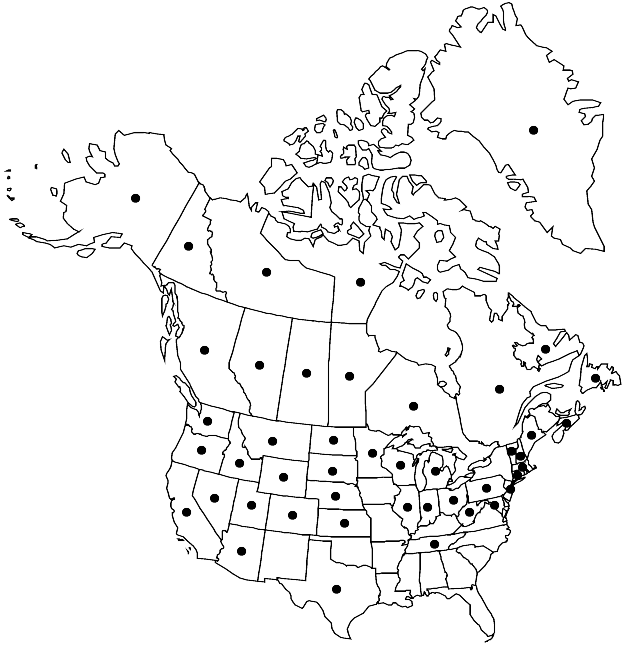Ptychostomum pendulum
Syll. Pl. Nov. 1: 64. 1822.
Plants in dense or open turfs, green, red-green, or yellow-green. Stems 0.5–1 (–1.5) cm, tufted, comose, innovations elongate and evenly foliate, often strongly radiculose. Leaves yellow-green to red-green, weakly to strongly contorted or shrunken when dry, ovatelanceolate, concave, (0.4–) 0.8–1.5 (–2.5) mm, enlarged toward stem apex; base not decurrent; margins revolute to mid leaf, limbidium strong, in 2 or 3 rows; apex acuminate; costa long-excurrent, awn denticulate; proximal laminal cells 3–4: 1, same width or narrower than more distal cells; medial and distal cells rhomboidal, 12–18 µm wide, 3–4: 1, walls thin. Specialized asexual reproduction absent. Sexual condition synoicous. Seta 1–3 cm. Capsule brown, pyriform, symmetric, 2–3 mm, mouth red; operculum short-convex, apiculate; peristome reduced; exostome teeth yellow basally, hyaline distally, appearing chambered due to adherence of endostome, lamellae indistinct, pores absent along mid line; endostome strongly adherent to exostome, basal membrane 1/3–1/2 exostome height, segments with ovate perforations, cilia reduced to nearly absent. Spores with size variable in same collections and capsules, (22–) 25–30 (–36) µm, strongly papillose, pale-brown.
Phenology: Capsules mature May–Aug.
Habitat: Dry calcareous soil or rock
Elevation: low to high elevations (0-4000 m)
Distribution

Greenland, Alta., B.C., Man., Nfld. and Labr., N.W.T., N.S., Nunavut, Ont., Que., Sask., Yukon, Alaska, Ariz., Calif., Colo., Conn., D.C., Idaho, Ill., Ind., Kans., Maine, Mass., Mich., Minn., Mont., Nebr., Nev., N.H., N.J., N.Dak., Ohio, Oreg., Pa., S.Dak., Tenn., Tex., Utah, Vt., Wash., W.Va., Wis., Wyo., South America, Eurasia, n Africa, Pacific Islands (New Zealand), Subantarctic Islands
Discussion
Ptychostomum pendulum is a small plant found in dry sites, similar overall to P. archangelicum and P. inclinatum. The larger spores and unusual chambered appearance of the exostome teeth are diagnostic. Capsules are needed for identification.
Selected References
None.
Lower Taxa
"narrower" is not a number."narrow" is not a number.